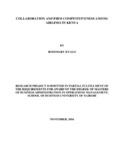| dc.description.abstract | Collaborations enhance competitiveness, which is derived through deploying internal capabilities and resources that allow the company to accomplish activities better than their competitors in terms of low cost and/or differentiated strategies. The study wanted to investigate the relationship between collaboration and firm competitiveness among airlines in Kenya. The study design that was adopted was that of descriptive survey research and was guided by the following objectives: to establish the various collaborative practices implemented by airlines in Kenya; and to determine the relationship between collaboration and firm competitiveness among airlines in Kenya. Both secondary and primary data were utilized in the study. The collection of primary data was done using a semi-structured questionnaire. Secondary data on the other hand was obtained from annual financial and corporate reports of the airlines. The respondents in the study were the strategic and operations managers of the airlines. The study population was the airline companies in Kenya, currently 66 in number. A census approach was applied in the study in which case the sampling frame consisted of all the 66 airlines operating in Kenya. A 5-point Likert scale was used in measuring the output of each of the items the participants answered. The variables numerical were described and analyzed using descriptive statistics. Using SPSS version 21 package, a Multivariate regression model was used to analyze the relationship between collaboration and firm competitiveness. The outcome of the study establishes a near perfect positive relationship between collaboration selection and firm competitiveness among airlines in Kenya with the regression analysis indicating that up to 87.2% of the firm performance among airlines in Kenya can be attributed to the collaboration practices they have adopted in over time. The study recommends that firms not only in the aviation sector to engage in inter-firm collaborations in a bid to enhance their core competencies. The study further recommends that firms in Kenya foster collaborative Private and public in designing the scope and functionality of a performance framework specifically tailored to the Kenyan macro-environment to enhance firm competitiveness. The study was limited to the extent that, a study of this magnitude needs to include the survey of many firms. This was however not possible due to the constraints of material and time resources, which did not make this possible. On the other hand, some of the respondents were non-committal due to the sensitivity of the subject matter. The study recommends further research to focus on the critical success factors in the adoption of best practices collaborative practices. Studies involving confirmatory factor analysis will need to be carried out to further test the model so established and to confirm the findings of the study. | en_US |



